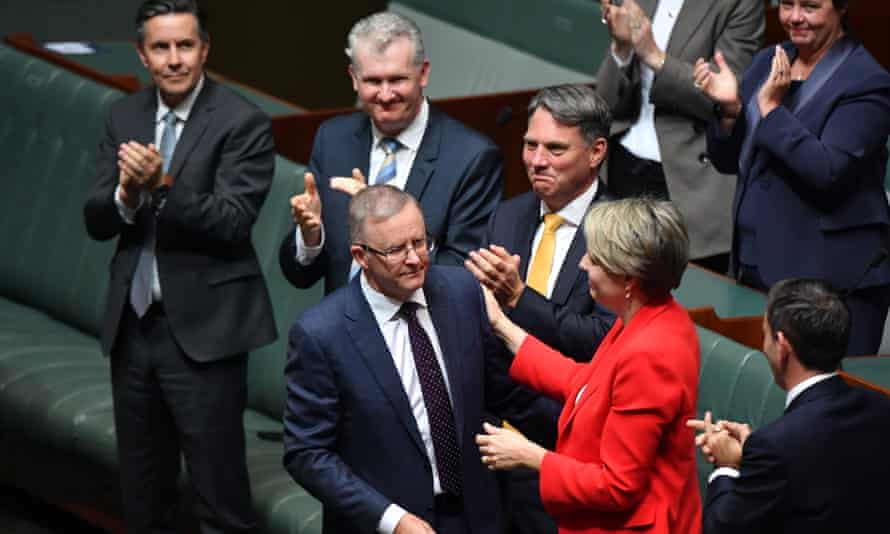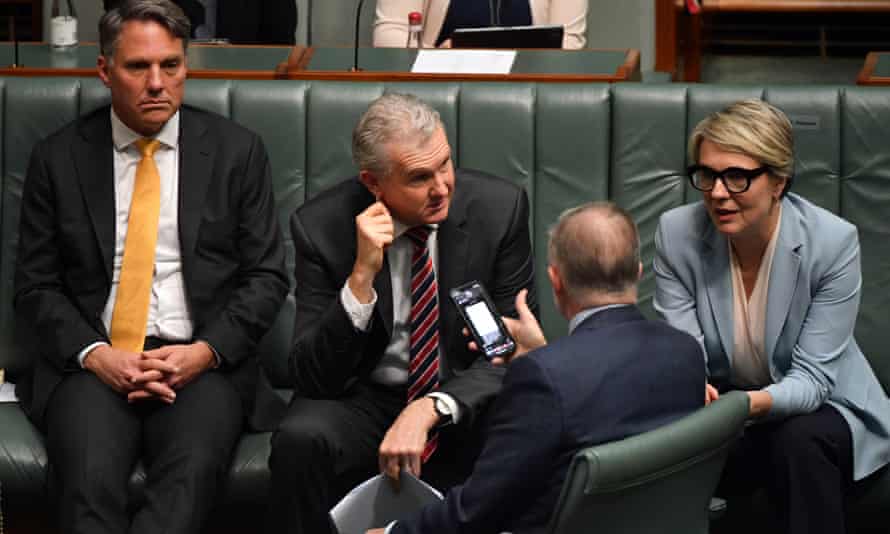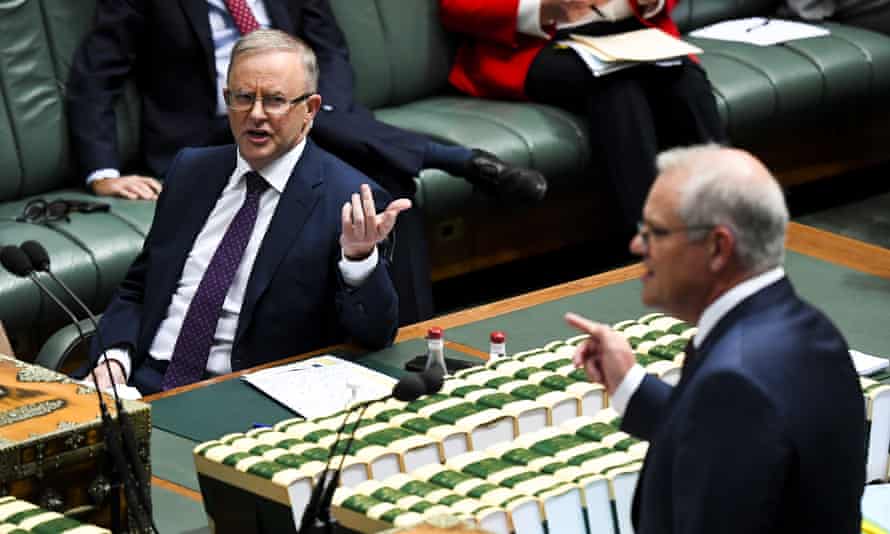Extract from The Guardian
Perhaps it’s off a low base, but the opposition’s morale seems better now than at the start of 2021

Last modified on Sat 29 May 2021 06.01 AEST
At the beginning of budget week, on 10 May, Labor’s marginal seat holders gathered in Canberra for a half-day session with the party’s national secretary, Paul Erickson.
The gathering was predominantly focussed on digital strategy. But at one point during the session, the frontbencher Michelle Rowland, who holds her western Sydney seat on a margin of 2.8%, asked Erickson a more existential question. What was the pathway to victory in the forthcoming election?
Some of the MPs present thought Erickson fobbed Rowland off. But others thought he provided a good answer, identifying the specific cohorts of voters Labor needs to target, in which regions, with concrete thoughts about how to reach them.
I’ll unpack the substance of Erickson’s response shortly, but we are starting here to illustrate a basic point. Perceptions are subjective. When reporters write pieces purporting to capture the current mood of a political party, they should come with a basic disclaimer. People have different views. How things are going usually depends on who you ask.
Some Labor MPs now firmly believe the path of least resistance was the right call
Anthony Albanese marked two years in the party leadership this week. Much of the reporting out of Canberra suggests Labor is in the doldrums, with MPs fretting Albanese will deliver the same crushing disappointment as Bill Shorten delivered in 2019 when he lost the supposedly unloseable election.
Joel Fitzgibbon, who regrets holding his tongue during the Shorten period, articulates that particular night terror more or less constantly, narrowcasting ruthlessly to the blue-collar constituents in the Hunter Valley who turned on him in 2019. This week, Fitzgibbon’s NSW neighbour and ally Meryl Swanson told caucus she feared Labor was about to sleepwalk off a cliff.
The loudest voices tend to shape public perceptions. But if you cast the net widely, the picture is actually more mixed. Perhaps it’s off a low base, but internal morale feels better now that it was at the start of 2021.
One senior figure captured the zeitgeist pithily. “I honestly think we’ve gone from not being a chance to a chance, but I wouldn’t put it higher than a chance. Scott Morrison is doing badly, but we are not yet doing well”.
Oppositions routinely worry about where the votes will come from. Some believe Albanese hasn’t yet articulated the case for change, that the leader is not sufficiently on the map; and they wonder whether the change case can get traction during a pandemic when voters want continuity and safety.
Albanese could also very obviously use the services of a head-kicking partisan like Peter Dutton in the lower house as the cycle enters the business end. But right now Labor women (and Albanese allies) in the Senate, Kristina Keneally, Penny Wong and Katy Gallagher, are doing the bulk of the heavy lifting. In the House, Albanese is surrounded by colleagues who would ultimately like his job, and a number of leadership alternatives appear more interested in keeping themselves clean and tidy for their next gig than on winning the current battle.

Richard Marles, Tony Burke, Anthony Albanese and Tanya Plibersek. Photograph: Mick Tsikas/AAP
So there are problems.
There is material there to work with, and Labor knows it is time to muscle up.
But MPs also know that Morrison will do anything to win. While Tony Abbott and Malcolm Turnbull would try and tough out difficult political battles, allowing Labor to make gradual political inroads, Morrison engages in constant zero remorse repositioning to close off momentum for his opponents.
Rather than locating his preferred hill to die on, the prime minister is like mercury, moving all the time. The perception in Labor ranks is Morrison is the “just enough” guy. When voters start to get angsty about his deficiencies, he does just enough to quell the rebellion.
Any marksman knows it is hard to hit a moving target, and it is easy to be demoralised when you miss.
The pathway to victory
Let’s track back now to that marginal seat holders forum in Canberra a couple of weeks ago, and capture the particulars of what Labor’s national secretary told Rowland about the pathway to victory.
According to people in the room, Erickson told Rowland Labor would be targeting Coalition-held seats in every state, and working off a smaller list than the party had in 2019, somewhere in the order of 15 seats. The targeted electorates, by and large, are in the outer suburbs and regions. The targeted voters are working families, worried about the costs of childcare, and paying the mortgage – people highly attuned to the state of the economy, and worried about their stagnant wages.
Again, there are mixed views about what this means for Labor’s federal chances. Some Labor MPs think that dynamic ultimately buttresses Morrison’s political position, because thus far – prior to the latest outbreak in Melbourne, and the accompanying backlash – he’s associated positively with the Covid response.

Anthony Albanese (left) listens to prime minister Scott Morrison during question time. Photograph: Lukas Coch/AAP
But others see opportunity. While Albanese’s strategy of avoiding excessive carping and negativity during the first wave pandemic response was seen in some quarters as a weakness – a fundamental failure of product differentiation – some Labor MPs now firmly believe the path of least resistance was the right call.
One MP (who contested elections during the Rudd/Gillard civil war, and the Shorten period) told me this week this is the first election they have contested where “people don’t hate us”. There was no civil war for constituents to be furious about, and (referencing the Shorten era) no leader to feel negative about. The MP said there was a strong view among the local Labor rusted-ons that Albanese needed to be tougher with Morrison, but more generally, “this is the first time the backdrop has felt benign to me”. From that benign base, constructive critique can build.
The leader is telling nervous colleagues Labor is competitive
People nominate other pluses. Labor does not enter the coming campaign as favourites. Labor MPs will not be defending a change to franking credits on booths at the coming election. That complicated savings measure, coupled with the well organised fake news around a “death tax”, killed the party’s chances in more than one seat. Labor continues to grapple with climate policy, which creates a faultline between progressives and some of the party’s traditional working base, but the Queensland Adani project doesn’t seem quite as totemic as it was in 2019.
Covid being good for incumbents has also strengthened Labor’s campaign position structurally in two states where the party is normally weakest – Queensland and Western Australia. Things are very difficult in NSW, and mixed in Tasmania, but for now at least, better than they have been up north and out west.
This optimism comes with caution, however. Labor in Queensland will not only be trying to win seats the government now holds with very comfortable margins after the colossal wipeout in the state in 2019, it will also be defending some “held” seats that the Coalition is targeting, seats like Moreton and Lilley.
This caution seems well-founded. I’ve lost count of the number of times over the past 20 years that someone in Labor has declared things have turned a corner in Queensland, only to see the party go backwards in the geography the Coalition now claims as its rusted-on cultural heartland.
‘We are getting to the phase where we can be more competitive’
Albanese has been working to get match fit for what he conceptualises as the fourth quarter. He’s lost more than 10kg, the wardrobe has been edited and updated, and the natural yarner is trying to master the art of sticking to a script and speaking in soundbites without sounding like a fake.
Albanese marked his second anniversary in the leadership with a Facebook live forum streamed to party members. He told them it was hard to recover from the blow of losing the 2019 election. Labor’s deputy leader, Richard Marles, says when Albanese got the leadership “we were dealing with the biggest moment of grief in living memory – it was an incredibly difficult time to assume the top job”. Albanese said “getting ourselves off the mat and getting competitive was a big thing”.
Albanese said his focus from the beginning had been how to win the election, not how to win the day. Both friends and frenemies say he’s both tactical and strategic, survival skills you learn growing up and scrapping in the brutal NSW party machine.
The leader is telling nervous colleagues Labor is competitive and Morrison can be beaten.
Labor’s Senate leader, Penny Wong, has been Albanese’s friend for 30 years. “I think what Albo has done has kept us in the race through a period where that was really difficult, and now we are getting to a phase where we are, and can be more, competitive,” she tells me between Senate estimates hearings this week.
“There is more capacity for oppositions to take on the governments,” Wong says. “There is more capacity to put forward a different plan for the country”.
I ask her whether Albanese, who absorbed much of the emotional and practical trauma of the Rudd/Gillard fight, has the ardour, the hunger, to tear down a politician like Morrison. Surely a life outside the accumulated psychic injuries of politics would be more appealing?
“I think it is a legitimate question about how you manage the ups and downs of politics,” she says. “Albo knows what it’s like to be down as well as up, and the thing about him is he learns from that.”
Wong says Albanese wants to win. “He looks to how you win the fourth quarter. If you look to his political history, you see that”.
I ask her how Labor wins the fourth quarter. Like, really. How does that happen?
“It’s hard,” she says. “I recognise that. We take nothing for granted. We know that we will fight on wage and jobs and the future. I don’t think 12 years of this government is good for the country – and that’s what they are asking for.”
What would she say to colleagues who fear this is impossible?
“We can do this.” She shifts emphasis slightly. “Remember why we do this. Labor governments change the country for the better.”
No comments:
Post a Comment